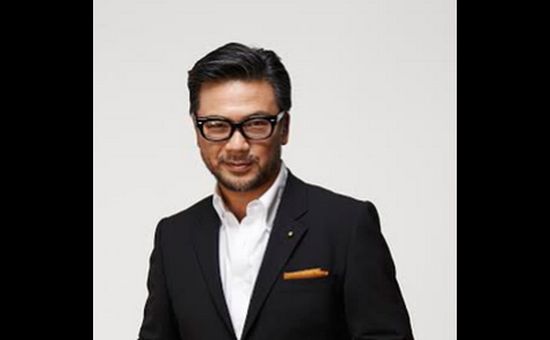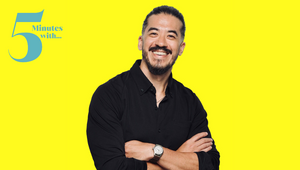
5 Minutes With… Tim Cheng

These days he's the CCO of DDB Group Shanghai, but over his 17 year career Tim Cheng has been an award winning art director and creative director at digital agencies in the United Kingdom, Australia and Greater China. He brings with him an international perspective of creative strategy, and a proven record of successful online communication with an emphasis on innovation.
Cheng has received numerous creative awards and accolades from Spikes, AdFest, D&AD and Cannes over the years. He is also an active participant in judging and speaking at local and international creative conferences. He joined as executive creative director of Tribal DDB Hong Kong in 2009 and then took up the position of joint executive creative director of DDB Guoan Beijing in early 2012.
Within the short span of one year, Cheng helped set up Tribal DDB Beijing and earned the industry’s recognition as a top three finalist at the 2012 Campaign APAC’s Greater China Digital Agency of the Year Awards. In April 2013, Cheng was promoted to chief creative officer of DDB Group Shanghai.
Cheng catches up with LBB Asiapac editor Larissa Meikle to discuss his adventures 18 months into the new role.
LBB> You studied in Sydney and your career has seen you go on to work all over the world. What got you into advertising in the first place?
TC> While I was still studying at the College of Fine Arts in Sydney, I became interested in computer art. Back then in the early '90s, anyone with a modem and some html abilities could call themselves a web designer. So I taught myself to become one and spent the next ten years focused on creating interface and user experiences, with projects ranging from websites, to touch screen exhibitions for museums, to interactive installations for the World Expo, to inflight entertainment system for an airline. I was never really interested in working in advertising and thought agencies had no idea about how to really engage users. That changed when I got back from London and by chance took on a four weeks contract working in the digital department for an ad agency. I met a group of amazing, like-minded people who believed that digital was the future of advertising. Four weeks became four years at that agency. I was converted.
LBB> What drew you to DDB Group Shanghai and how has your time at the agency proved so far?
TC> It’s all about the people. Namely my CEO Richard Tan and my partner in crime Jit Hoong Ng. We first met at DDB Beijing and quickly realised that while we all had different strengths; when we collaborated together we were unbeatable. Back then, DDB Group Shanghai was going through a difficult phase. We saw it not as a problem, but as a unique challenge for us to rebuild the agency into one that followed our vision. Jit and I, both digital guys, had the opportunity to take our experience and transformed DDB Group Shanghai from a traditional advertising agency into an agency for the future with digital at its heart.
LBB> 18 months into your new role, what are some of the changes you have implemented at the agency?
TC> We have made many structural and operation changes, but the most significant change that resulted in a drastic improvement of our work is the implementation of a collaborative culture:
Collaboration between departments – instead of the traditional copy writer/art director system, we teamed up creative/planner/account members as a threesomes to work together for ideations. We called them our 'Trinity'.
Collaboration between teams – transforming the silo mentality of the agency where teams only focused on their own clients. We created new opportunities and events to enable them to collaborate with other team members on exciting projects. We called this Creative PowWow.
Collaboration with clients – we know consumer behaviours, but our clients know their business best, and good ideations should be a collaboration between agency and the client team. We regularly hosted intense creative workshops where we worked with clients to generate creative business solutions. We called this Co-Creation.
LBB> In January 2015 DDB named three new executive directors in Shanghai, promoting Zheng Li from group creative director and appointing Adams Fan and Don Huang with immediate effect. What has it been like to work with your new executive team?
TC> Zheng, Adams, and Don are the new generation of China’s trained creative leaders. They all have strong international perspectives rooted in a powerful understanding of local insights. Not only are they talented and nice, but also equally as important, they all share our desire to use our creativity to make a difference in society. Everyday I work with them I learn something new too.
LBB> What are some of the challenges you face on China's digital platform and notable industry differences with the West?
TC> China has one of the most unique, and arguably some of the most advanced digital platforms in the world. But they are also mostly tightly controlled, closed systems that are not as easy to develop for as most western platforms.
LBB> I hear you are entering some strong work into Cannes this year. Can you tell us what kind of work you believe will do well at the festival?
TC> Our view is that great work should make a difference not only for the brands, but also for the world that we live in. I would love to see winning work that shows that creativity can make a positive impact both in the client’s business, and in some way, improve the lives of the target audience.
LBB> Having been a judge at international award shows yourself, do cultural barriers play a part in work receiving the recognition it should? How do you overcome this?
TC> I believe the world is getting smaller every day and international judges are now truly citizens of the world. While there may still be some barriers in understanding the small nuisances in some cultures, such as the art of copy writing in Chinese, the great work that inspires us all should transpire cultures, as they are inevitably based on human nature.
LBB> What does innovation mean to you and how do you foster innovative thinking in your creative teams?
TC> We believe innovation is about finding a new and better way to do something. Innovation can be enabled by technologies, but can equally be about approaching a problem from a different perspective, and coming up with a simpler solution. We always have to challenge ourselves by asking the question: is there a better way?















